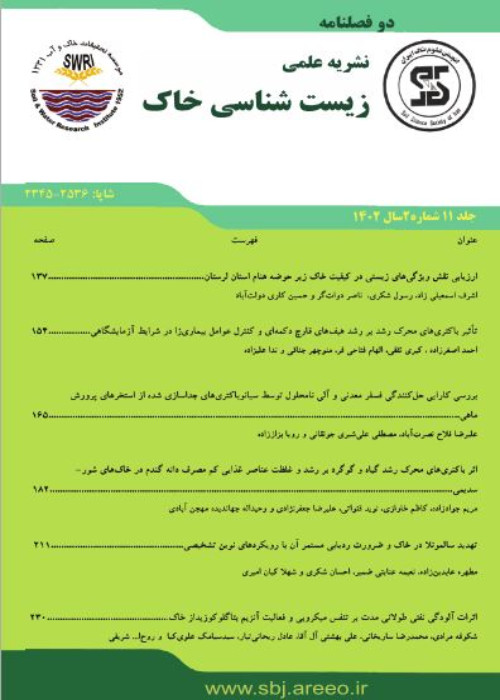Evaluation of the Effect of Rhizospheric and Non-Rhizospheric phosphate Solubilizing Bacteria on Improving the Growth Indices of Wheat under Salinity and Drought Stress
Author(s):
Article Type:
Research/Original Article (دارای رتبه معتبر)
Abstract:
Phosphate solubilizing bacteria application in dry-land farming is a strategy for decreasing the consumption of P- fertilizers and environmental stresses. In this study, 184 rhizosphere and non-rhizosphere bacterial isolates from Qazvin and Zanjan soils were screened for plant growth promoting traits and tolerance to salinity and drought stresses. According to the results, two rhizosphere bacterial strains (seudomonas sp. W7 and P. baetica W153) and two non-rhizospheric bacterial strains (Bacillus pumilus W72 and B. Safensis W73) were carefully chosen as superior strains. The effects of superior strains on wheat growth indices and plant P content were evaluated in a completely randomized design with factorial arrangement with three replications under drought stress (osmotic pressure -5 bar) and salinity (0.5% NaCl) stresses in vitro condition. Strains W7, W153, W72, W73 and B0 were considered as the first factor and the wheat cultivars Roshan (P-efficient cultivar) and Marvdasht (P-inefficient cultivar) were considered as the second factor. Rhizosphere bacteria were the best strains in the qualitative assessment (solubilization of organic and inorganic phosphate). Both groups of bacteria (rhizosphere and non-rhizosphere isolates) showed similar tolerances to salinity and drought stress. Growth indices of both wheat cultivars decreased under salinity and drought stress. The results showed that inoculation of two wheat cultivars with selected phosphate-solubilizing bacteria, while increasing the amount of soluble P in the growth medium, could significantly increase plant growth indices (30- 53%) and plant P uptake (14-32%) compared to non-inoculated treatments. The results also showed that non-rhizospheric bacteria (despite having lower phosphate solubilization ability) were more effective in solubilizing insoluble phosphate (rock phosphate) in plant growth medium than rhizosphere bacteria. In general, these results indicated that using phosphate solubilizing bacteria can reduce some of the limitations of wheat production in dry-land farming
Keywords:
Language:
Persian
Published:
Journal of Soil Biology, Volume:6 Issue: 1, 2018
Pages:
1 to 14
magiran.com/p1892532
دانلود و مطالعه متن این مقاله با یکی از روشهای زیر امکان پذیر است:
اشتراک شخصی
با عضویت و پرداخت آنلاین حق اشتراک یکساله به مبلغ 1,390,000ريال میتوانید 70 عنوان مطلب دانلود کنید!
اشتراک سازمانی
به کتابخانه دانشگاه یا محل کار خود پیشنهاد کنید تا اشتراک سازمانی این پایگاه را برای دسترسی نامحدود همه کاربران به متن مطالب تهیه نمایند!
توجه!
- حق عضویت دریافتی صرف حمایت از نشریات عضو و نگهداری، تکمیل و توسعه مگیران میشود.
- پرداخت حق اشتراک و دانلود مقالات اجازه بازنشر آن در سایر رسانههای چاپی و دیجیتال را به کاربر نمیدهد.
In order to view content subscription is required
Personal subscription
Subscribe magiran.com for 70 € euros via PayPal and download 70 articles during a year.
Organization subscription
Please contact us to subscribe your university or library for unlimited access!



